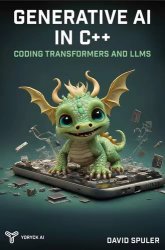 Название: Generative AI in C++: Coding Transformers and LLMs Название: Generative AI in C++: Coding Transformers and LLMs
Автор: David Spuler
Издательство: Yoryck AI Pty Ltd.
Год: March 30, 2024
Страниц: 1206
Язык: английский
Формат: pdf, epub, mobi
Размер: 10.1 MB
Do you know C++ but not AI? Do you dream of writing your own AI engine in C++? From beginner to advanced, this book covers the internals of AI engines in C++, with real source code examples and research paper citations.
As a programmer, your job is to harness the power of your AI platform and offer it up to your many users in top-level features. Whether your AI project is about writing sports content or auto-diagnosing X-ray images, your work as an AI developer is based on fundamentally the same architecture. And to do this at a scale that matches the capability of your workhorse models, you need a programming language to match its power. I'll give you three guesses which one I recommend.
C++ is on the inside of all AI engines. Whereas Python is often on the outside wrapping around the various models, C++ is always closer to the machine and its hardware. PyTorch and Tensorflow have lots of Python code on the top layers, but the grunt work underneath runs in highly optimized C++ code. The main advantage of C++ is that it is super-fast, and has low-level capabilities, that makes its operations close to those of the hardware instructions. This is a perfect match, because AI engines need to run blazingly fast, with hardware-acceleration integrations direct to the GPU to handle literally billions of arithmetic calculations. And yet, C++ is also a high-level programming language with support for advanced features like classes and modularity, so it's great for programmer productivity.
Key Features:
Transformer components in C++
Faster and smarter AI
Play with an AI engine on your desktop
Cutting-edge research optimizations
Just C++ code without all the math
Contents:
Part I: AI Projects in C++
1. Introduction to AI in C++
2. Transformers & LLMs
3. AI Phones
4. AI on Your Desktop
5. Design Choices & Architectures
6. Training, Fine-Tuning & RAG
7. Deployment Architecture
Part II: Basic C++ Optimizations
8. Bitwise Operations
9. Floating Point Arithmetic
10. Arithmetic Optimizations
11. Compile-Time Optimizations
12. Pointer Arithmetic
13. Algorithm Speedups
14. Memory Optimizations
Part III: Parallel C++ Optimizations
15. Loop Vectorization
16. Hardware Acceleration
17. AVX Intrinsics
18. Parallel Data Structures
Part IV: Transformer Components in C++
19. Encoders & Decoders
20. Attention
21. Activation Functions
22. Vector Algorithms
23. Tensors
24. Normalization
25. Softmax
26. Decoding Algorithms
27. Tokenizer and Vocabulary
Part V: Optimizing Transformers in C++
28. Deslugging AI Engines
29. Caching Optimizations
30. Vectorization
31. Kernel Fusion
32. Quantization
33. Pruning
34. MatMul/GEMM
35. Lookup Tables & Precomputation
36. AI Memory Optimizations
Part VI: Enterprise AI in C++
37. Tuning, Profiling & Benchmarking
38. Platform Portability
39. Quality
40. Reliability
41. Self-Testing Code
42. Debugging
Part VII: Research on AI Optimization
43. Overview of AI Research
44. Advanced Quantization
45. Knowledge Distillation
46. Structured Pruning
47. Early Exit and Layer Pruning
48. Width Pruning
49. Length Pruning
50. Adaptive Inference
51. Zero-Multiplication Models
52. Logarithmic Models
53. Arithmetic Optimization Research
54. Ensemble Multi-Model Architectures
55. Advanced Number Systems
56. Neural Architecture Search
Appendix 1: C++ Slug Catalog
Скачать Generative AI in C++: Coding Transformers and LLMs
|